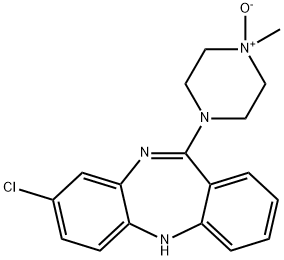34233-69-7
中文名稱
氯氮平-N-氧化物
英文名稱
CLOZAPINE N-OXIDE
CAS
34233-69-7
分子式
C18H19ClN4O
分子量
342.82
MOL 文件
34233-69-7.mol
更新日期
2025/05/14 11:25:41
 34233-69-7 結(jié)構(gòu)式
34233-69-7 結(jié)構(gòu)式
基本信息
中文別名
氯氮平氮氧化合物氯氮平 N-氧化物
MAJORMETABOLITEOFCLOZAPINE.POSSESSESLITTLEORNOACTIVITYAT5-HTRECEPTORS
英文別名
CLOZAPINE N-OXIDEClozapine N-oxide solution
Clozapine N-oxide Methanol Adduct
e)(1,4)diazepine,8-chloro-11-(4-methyl-1-piperazinyl)-5h-dibenzo(n-oxide
8-CHLORO-11-[4-METHYL-1-PIPERAZINYL]-5H-DIBENZO[B,E][1,4]DIAZEPINE N-OXIDE
所屬類別
生物化工:激動劑抑制劑物理化學性質(zhì)
熔點190-248°C
閃點9℃
儲存條件-20°C Freezer, Under Inert Atmosphere
溶解度溶于二甲基亞砜。
酸度系數(shù)(pKa)6.86±0.20(Predicted)
形態(tài)粉末
顏色黃色
生物來源synthetic
穩(wěn)定性Stable for 1 year from date of purchase as supplied. Solutions in DMSO or ethanol may be stored at -20°C for up to 3 months.
InChIKeyOGUCZBIQSYYWEF-UHFFFAOYSA-N
安全數(shù)據(jù)
警示詞危險
危險性描述H301-H336
防范說明P301+P310+P330
危險品標志Xn,T,F
危險品運輸編號UN 2811 6.1/PG 3
危險品運輸編號UN 2811 6.1/PG 3
WGK Germany3
WGK Germany3
RTECS號HP1760000
危險等級6.1(b)
包裝類別III
海關(guān)編碼29335990
氯氮平-N-氧化物價格(試劑級)
| 報價日期 | 產(chǎn)品編號 | 產(chǎn)品名稱 | CAS號 | 包裝 | 價格 |
| 2025/02/08 | HY-17366 | 氯氮平-N-氧化物 Clozapine N-oxide | 34233-69-7 | 5mg | 750元 |
| 2025/02/08 | HY-17366 | 氯氮平-N-氧化物 Clozapine N-oxide | 34233-69-7 | 10mM * 1mLin DMSO | 825元 |
| 2025/02/08 | HY-17366 | 氯氮平-N-氧化物 Clozapine N-oxide | 34233-69-7 | 10mg | 1100元 |
常見問題列表
生物活性
Clozapine N-oxide (CNO) 是一種 Clozapine (GLXC-06516) 的代謝產(chǎn)物,是 human muscarinic designer receptors (Designer Receptors Exclusively Activated by Designer Drugs, DREADDs) 的激動劑。Clozapine 是一種有效的 dopamine (DA) 拮抗劑和選擇性的 muscarinic M4 receptor 的激動劑。靶點
| Target | Value |
|
DREADD
() | |
|
Dopamine receptor
() | |
|
muscarinic M4 receptor
() |
體外研究
Clozapine N-oxide (CNO) can bind to non-DREADD receptors at concentrations required for DREADD activation, and undergoes reverse-metabolism to its parent compound clozapine, an atypical antipsychotic that acts at a variety of pharmacological targets and produces numerous physiological and behavioral effects.
體內(nèi)研究
After a single intraperitoneal (i.p.) injection of Clozapine N-oxide (1 mg/kg) into mice, Clozapine N-oxide (CNO) plasma levels peak at 15 min and are very low after 2 h. Despite the short plasma half-life of CNO in mice, the biological effects that have been described after acute treatment of DREADD-expressing experimental animals are usually much longer (6-10 h).
